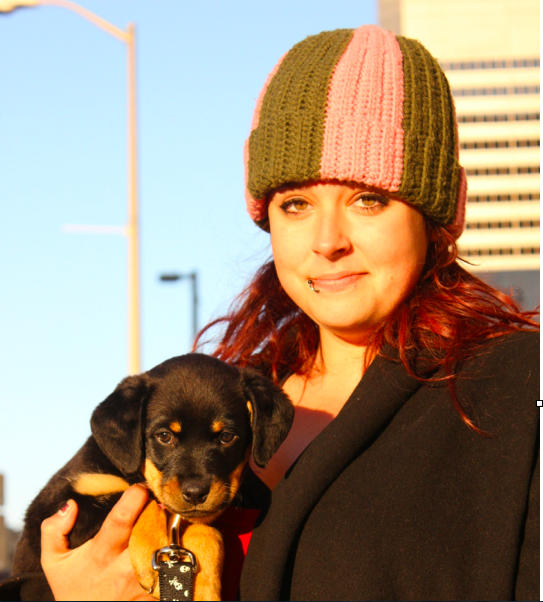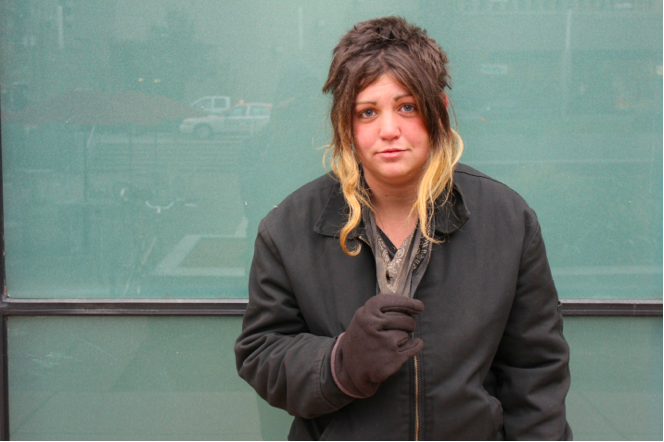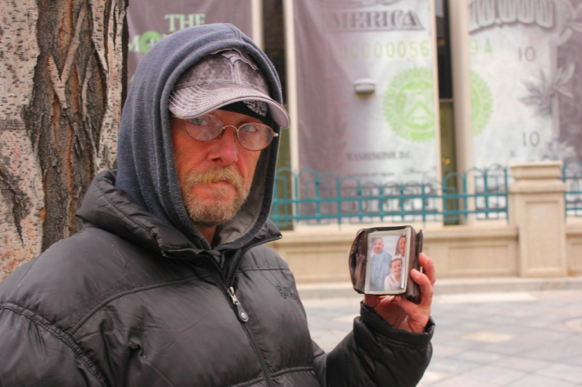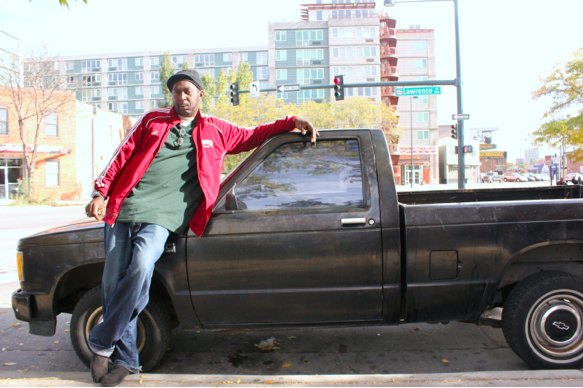Prized possession is a project about materialism, homelessness and connection through the human story.
I approached homeless individuals in Denver, Colorado with one simple question:
“What is your most prized possession?”
They were then given the chance to share their story, the story of this prized possession and pose for a portrait with their answer.
Possessions come and go. The emotional attachment with them remains eternal. What do each of us treasure in our heart and soul? And why?
What is your most prized possession? The answers stem from an array of places such as emotional comfort, survival needs, to sentimental value and many more. Ponder these questions as you enjoy people opening up to share their stories and reasons for valuing what they do.
~
1. Bobby Dean Grabau
Possession: His Sign
“I’m diagnosed as chronically homeless,” explains 38 year old, Denver native, Bobby Dean, holding up a handmade sign to passing cars on the outskirts of the park.
He is open to share his story with a slow, raspy voice. He considers his situation more of a choice than a plight. “I choose the homeless lifestyle. It gets risky once in awhile. The winter is a risky one.”
His path to life outside began in 2000 after being kicked out of his parents house: “First time I became homeless I was living with my parents and wasn’t supposed to smoke marijuana and my mom kicked me out. I put a brick through a car window. My car. I ended up under a bridge. Classic story,” he recalls with a hint of humor.
Now a veteran to life on the streets, those early days of homelessness seem like a lifetime ago for Bobby Dean. “You begin eating out of dumpsters. Then you slowly adapt.” Before long, the fruits of this life began outweighing the hardships. “I’m addicted to it (homelessness). It’s a f*cking rush being around all these people all the time. The way I am, the way I smell, my voice. Hell of a psychological understanding.” He declares alcohol to be his substance of choice, and enjoy a mid-day drink. “I stick to the alcohol, cigarettes, and marijuana. Occasionally the hard stuff.”
Most Prized Possession: Bobby Dean’s sign is his most prized possession and has storied history. “A black magic marker and piece of cardboard from a trashcan has literally kept me alive, fed me, drugged me, since 2001,” he declares. “This same one.” He appreciates his connection to it. “Occasionally I’ll try and spice it up,” he adds. “It keeps me out of trouble. Unless I fall out on the corner from too much alcohol. That can happen. Days when I just trip.” Standing in the sunshine, Bobby Dean holds it on display.
~
2. Meagan
Possession: Black Bandana
At 23, Meagan has been homeless on and off since the age of 16. Originally stationary on the streets of Philadelphia, she has since been in transit for the three years prior to our meeting. Meagan is well aware of the harsh realities of life on the streets. She wears her seven plus years of homelessness in the gentle, mellow, and detached manner in which she describes some of the tribulations of her experiences. “I wasn’t brought up in a great family I guess, ya know? Parents weren’t ready to have a kid and sh*t. Pretty much found my way on my own.”
Regardless, her shy, kind, softness, contrasts the hardness of the surrounding cold concrete and her tales of the road that took her to Denver. “We were trying to head up north towards Oregon. Trying to get out of Arizona because the cops are really bad over there with being on the streets and stuff. They tried to charge us with a felony for squatting, our dog got stolen, so we were just trying to get out of there. Some kids were like, ‘We’re going to Denver, Colorado,’ so we were like we might as well check out Colorado. We thought we had a place to stay here but got in an argument with the guy so that didn’t work out.”
Most Prized Possession: Her black bandana is her prized possession, simply because she has managed to hold onto it. “All my stuff got stolen so I guess I would have to say this (black bandana). I’ve had it since like Houston. So it’s got a decent amount of miles on it and stuff ya know. It’s just something I don’t lose. It’s the one things I’ll never lose. I lose packs, I lose sleeping bags, stuff gets stolen. But this stays right here (around her neck). Living outside makes you appreciate the things you should appreciate in life rather than name-brand products. It makes you very un-materialistic, because you never know when you’re gonna lose something. Material objects come and go.” As I depart she sweetly tells me, “I hope your book gets published.”
~
3. Larry
Possession: Wallet Photo of Family
A Vietnam veteran from Portland, Oregon, Larry has been intermittently homeless for 20 years. The first subject of the projet, he was open in sharing his tales. “I’ve had moments where I thought, ‘Oh I want this (housing),’ but every time I get there it’s not where I need to be. I don’t like the pressure of having to pay rent, pay the electric man, get food.”
To Larry, there is an insanity in the acquiring and hoarding of stuff. “I don’t have a lot. But I have sufficient enough. I don’t need more, more, more, more, more. I share what I have.” There is no shame in the simplicity of this lifestyle. “It’s okay to be here. I am not ashamed of my homelessness. I don’t even like that term homeless. I’m a human being. Everybody is a human being. It took me a long time to get to that. Some of the most talented people I’ve ever met are on the streets.”
While the points of wisdom continued to be shared, Larry acknowledges survival on the streets came with experience. “When I first hit the streets, I didn’t know what to do. I didn’t know where to eat. There are a lot of people who help.”
Most Prized Possession: A wallet sized photograph of Jessica, the younger of his two daughters, with his granddaughter Kayla, and his son-in-law, John. His most prized possession was a source of emotional strength. This part of his family lives in Washington state. It is a reminder of unconditional love for Larry. “If I lost this picture I would be heartbroken. My youngest daughter has stuck through me with everything more than anyone and I love her. She also sent it to me through the mail which seems to be rare these days.”
~
4. Mike
Possession: Chevy Truck
Fifty-two year old self-described “Florida boy,” Mike, works as a scrapper. “I go to the scrap yard. I get my scraps from alleyways and trains.” His resourcefulness hasn’t earned him enough to put a roof over his head just yet. One incident with the law, all the way back in 1996, still cripples his hunt for a decent-paying job. “They still hold it against me. You can find a job. But it ain’t paying nothing, brotha. Maybe 250 per week. A studio apartment is $600-$800 per month. It ain’t enough.”
Leaving his troubles behind in Florida, Mike’s been in Colorado since 2003. “Been kind of stuck here. Don’t wanna go no place else. Here, you can get your weed,” he says with a puff and a smile. However, he is stern in describing the absence of family and his descent into homelessness over two years ago. “It’s cause I ain’t got no blood. No mom, no blood.”
Most Prized Possession: His Chevrolet truck. It is a source of economic survival. “You can hustle with it. Move some furniture, move some scraps. With a truck, you can always make some money man.”
~
5. Paige
Possession: Puppy: “Mouse”
Only 20, Paige exudes an air of resilience with her head held high and her voice strong and clear. “My mom kicked me out when I was 16. I’ll go in between having a place and being homeless again.” She arrived in Denver just two weeks prior after a journey that took her “all the way up to Maine and down through Texas.” Her stay in the city has been positive, thanks to a local friend who introduced her to a wider social network of “really cool” people.
Paige says she left Kansas City because she, “didn’t have anything left.” She spends her days socializing in the park while trying to locate places to sleep and food to eat. As for the future, Paige says she is eventually “hoping to settle down in like Oregon, but that’s probably going to be a while.”
Most Prized Possession: Mouse, Paige’s new puppy and friend came into her life when Paige found her “running down the street in a really bad neighborhood.” The six-week-old puppy has given her a sense of purpose she claims. “It’s the one thing I have right now. It’s nice to take care of something. She loves the shit out of me.”
***
There are two main objectives to this project. The first is to examine the way in which we relate to “things,” from people in our society who have the fewest material goods. The second, is to humanize the epidemic of homelessness in this country, by giving homeless individuals a chance to share their personal journeys. This population are largely categorized as a problem. By empowering some of them with a chance to share their stories, we are reminded, these are unique humans, like each of us. And we can learn from them.
Upon returning to the United States after living overseas for several years, I was struck by two very apparent things taking place here.
The first was the epidemic of homelessness in my native country. Masses of people living on the streets. Human beings, in our cities, without homes. There are an estimated 11,000 homeless individuals in Denver. Across the United States there are over 600,00 homeless individuals.
The second, is our addiction to consumerism/materialism. We want more. Our society operates in a way where we are able acquire new things, when we want. Walk into any store. Look at advertising. Often, the message is, you are less than, unless you have this product. We are surrounded by it, often unknowingly. Does this lessen the appreciation of the things we currently own? Messages that infiltrate us from the outside are dominated by acquiring more externally, than looking inside for happiness.
To see more, go to the Prized Possession Project on Facebook.
Relephant:
Nine Common Misconceptions About the Homeless.
Author: Keith Allen
Editor: Travis May
Photo: Provided by Author















Read 1 comment and reply